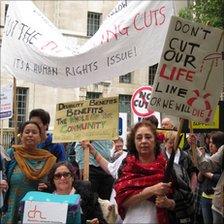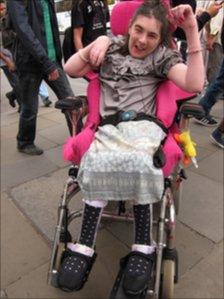'Hardest hit' speak out about spending cuts
- Published

Cuts to disability benefits could mean disabled people cannot afford transport
"Stop - would you like to be disabled? I didn't ask to be," read one placard. Another, in blue felt-tip pen, said: "I'm not here as the lift has been broken for three weeks!"
Many more were designed to make people on London's Embankment - and perhaps David Cameron and his colleagues - pause and think for a moment.
They were being held aloft at a colourful rally to deliver a message to the government to stop spending cuts to welfare benefits.
Many protesters were in wheelchairs or had guide dogs and white sticks.
They had come from right across the UK and were representing some 40 or so charities and organisations and a whole range of disabilities, both visible and hidden.
Asked what the cuts would mean to her, Kirsty Gerrard, who has cerebal palsy, summed it up in three words: "Can't get out."
Her carer elaborated, saying it would mean no transport to see family and friends and the closure of daycare centres where Miss Gerrard does most of her socialising
Under cloudy skies, and against a backdrop of the London Eye, actress and charity campaigner Jane Asher told the crowds: "This is the largest rally of disabled people in living memory, and that's something to be proud of - at the same time, it is very sad that it has come to this.

Kirsty Gerrard, who has cerebal palsy, had a tough journey to London from Bournemouth
"I am calling on the government, with all of you, to put a stop to these cuts - they are cruel, they are misguided, and they are badly drafted."
Most troubling, say campaigners, are cuts to the disability living allowance, which helps pay for people's transport and ensures they can live independently, and new work capability assessments, considered to be unfair for many.
Lord Low, president of the Disability Alliance, estimates 700,000 people will be affected by the cuts.
Later, Miss Asher, who is president of Arthritis Care, said there had been a rise in suicidal calls to its helpline. "People are very frightened and upset," she said.
At the rally however, any fear had been cast aside for the day leaving a good-humoured mood, but one with angry undertones.
Gerard Maguire, from a deaf group in Islington, smiling and wearing latex blue gloves, attracted the attention of Labour MP Liam Byrne as he came off stage after an impassioned speech.
A sign language interpreter told Mr Byrne he was wearing them to symbolise the government "cutting their hands off".
'No privacy'
Dino Goldie, a 33-year-old from Bath who has been blind since the age of six, was one of many who were desperate to get across the reality of being disabled.
"Disability is not a consumer choice," he said.
"How would you feel about having your bank statements and medical notes read by your next-door neighbour? How would you like to be barred from clubs, bars and taxis because of your disability?

Dino Goldie said his placard read 'we're being shafted by the government!'
"This government has some very strange notions of dignity, privacy and responsibility."
There was also anger directed at benefit cheats. One placard summed it up: "I'm no scrounger, I have MS".
Jim Lodge, from Peckham, who is blind, worries people who already fiddle the system will go on receiving benefits, but honest people - who haven't learned how to play the system - will end up with no help.
He is one of few in the blind community to work full time, earning less than £1,000 a month, but says it does not go far.
"If you want to buy anything, it's four times dearer than for sighted people," he said.
Talking weighing scales would set him back £40, whereas an ordinary set from Argos would be no more than £10, he says.
Then there are the white sticks which cost £20 each, and another £10 every time the tip needs replacing. An electronic voice-operated organiser might cost £150, while special reading devices near £1,600.
Without it though, blind people have to rely on other people to read their private mail, says Ray Steptoe, from nearby Bermondsey, who is also blind.
"It's expensive to be disabled.
"The disability living allowance helps us retain a reasonably normal life, whatever normal is."
- Published11 May 2011
- Published28 April 2011